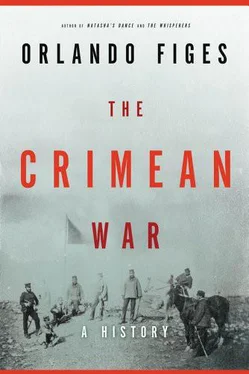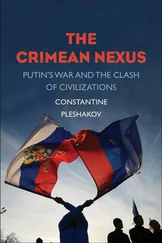Nicholas, too, was convinced that the collapse of the Ottoman Empire was at hand. He was prepared to hasten its demise and liberate the Balkan Christians, provided he could get the other powers, or at least Austria (his closest ally with interests in the Balkans), on his side. As his troops advanced towards the Turkish capital, Nicholas informed the Austrian ambassador in St Petersburg that the Ottoman Empire was ‘about to fall’, and suggested that it would be in Austria’s interests to join Russia in the partition of its territories in order to ‘forestall the people who would fill the vacuum’. The Austrians, however, mistrusted Russia and chose instead to preserve the Concert of Europe. Without their support, Nicholas held back from dealing the fatal blow to the Ottoman Empire in 1829. He was afraid of a European war against Russia should his attack on Turkey move the other powers to unite in its defence, and even more afraid that the collapse of the Ottoman Empire would result in a frantic rush by the European powers to seize Turkish territories. Either way, Russia would lose out. For this reason, Nicholas abided by the viewpoint of his cool and calculating Foreign Minister: that it would best serve Russia’s interests to keep the Ottoman Empire in existence, but in a weakened state, where its dependence on Russia for survival would enable the promotion of Russian interests in the Balkans and the Black Sea area. A sick Turkey was more useful to Russia than a dead one. 21
Consequently, the Treaty of Adrianople was surprisingly kind to the defeated Turks. Imposed by the Russians in September 1829, the treaty established the virtual autonomy of Moldavia and Wallachia under Russian protection. It gave the Russians some islands in the mouth of the Danube, a couple of forts in Georgia and the Sultan’s recognition of their possession of the rest of Georgia as well as the south Caucasian khanates of Erivan and Nakhichevan, which they had wrested from the Persians in 1828, but compared to what the Russians might have forced out of the defeated Turks, these were relatively minor gains. The two most important clauses of the treaty secured concessions from the Porte that had been wanted by all the signatories of the Treaty of London: Turkish recognition of Greek autonomy; and the opening of the Straits to all commercial ships.
The Western powers did not trust these appearances of Russian moderation, however. The treaty’s silence on warship movements through the Straits led them to conclude that Russia must have gained some secret clause or verbal promise from the Turks, allowing them exclusive control of this crucial waterway between the Black Sea and the Mediterranean. Western fears of Russia had been growing since the outbreak of the Greek revolt, and the treaty fuelled their Russophobia. The British were especially alarmed. Wellington, by now the Prime Minister, thought the treaty had transformed the Ottoman Empire into a Russian protectorate – an outcome worse than its partition (which at least would have been done by a concert of powers). Lord Heytesbury, the British ambassador in St Petersburg, declared (without any intended irony) that the Sultan would soon become as ‘submissive to the orders of the Tsar as any of the Princes of India to those of the [East India] Company’. 22The British may have totally supplanted the Mughal Empire in India, but they were determined to stop the Russians doing the same to the Ottomans, presenting themselves as the honest defenders of the status quo in the Near East.
Fearful of the perceived Russian threat, the British began to shape a policy towards the Eastern Question. To prevent Russia from gaining the initiative in Greece, they gave their backing to the independence of the new Greek state, as opposed to mere autonomy under Turkish sovereignty (which they feared would make it a dependant of Russia). British fears were not unwarranted. Encouraged by the Russian intervention, Kapodistrias had been calling on the Tsar to expel the Turks from Europe and create a larger Greece, a confederation of Balkan states under Russian protection, on the model once proposed by Catherine the Great. However, the Tsar’s position was seriously weakened by the assassination of Kapodistrias in 1831, followed by the decline of his pro-Russian party and the rise of new Greek liberal parties aligned with the West. These changes moderated Russian expectations and cleared the way for an international settlement at the Convention of London in 1832: the modern Greek state was established under the guarantee of the great powers and with Britain’s choice of sovereign, the young Otto of Bavaria, as its first king.
The ‘weak neighbour’ policy dominated Russia’s attitude to the Eastern Question between 1829 and the Crimean War. It was not shared by everyone: there were those in the Tsar’s army and Foreign Ministry who favoured a more aggressive and expansionist policy in the Balkans and the Caucasus. But it was flexible enough to satisfy both the ambitions of Russian nationalists as well as the concerns of those who wanted to avoid a European war. The key to the ‘weak neighbour’ policy was the use of religion – backed up by a constant military threat – to increase Russian influence within the Sultan’s Christian territories.
To enforce the Treaty of Adrianople, the Russians occupied Moldavia and Wallachia. During the five years of the occupation, from 1829 to 1834, they introduced a constitution ( Règlement organique ) and reformed the administration of the principalities on relatively liberal principles (far more so than anything allowed in Russia at that time) to undermine the remaining vestiges of Ottoman control. The Russians tried to ease the burden of the peasantry and win their sympathy through economic concessions; they brought the Churches under Russian influence; recruited local militias; and improved the infrastructure of the region as a military base for future operations against Turkey. For a while, the Russians even thought of turning occupation into permanent annexation, though they finally withdrew in 1834, leaving behind a significant Russian force to control the military roads, which also served to remind the native princes who took over government that they ruled the principalities at the mercy of St Petersburg. The princes placed in power (Michael Sturdza in Moldavia and Alexander Ghica in Wallachia) had been chosen by the Russians for their affiliations with the tsarist court. They were closely watched by the Russian consulates, which often intervened in the boyar assemblies and princely politics to advance Russia’s interests. According to Lord Ponsonby, the British ambassador to Constantinople, Sturdza and Ghica were ‘Russian subjects disguised as hospodars’. They were ‘merely nominal governors… serving only as executors of such measures as may be dictated to them by the Russian government’. 23
The desire to keep the Ottoman Empire weak and dependent sometimes required intercession on behalf of the Turks, as happened in 1833, when Mehmet Ali challenged the Sultan’s power. Having helped the Sultan fight the Greek rebels, Mehmet Ali demanded hereditary title to Egypt and Syria. When the Sultan refused, Mehmet Ali’s son Ibrahim Pasha marched his troops into Palestine, Lebanon and Syria. His powerful army, which had been trained by the French and organized on European principles, easily swept aside the Ottoman forces. Constantinople lay at the mercy of the Egyptians. Mehmet Ali had modernized the Egyptian economy, integrating it into the world market as a supplier of raw cotton to the textile mills of Britain, and even building factories, mainly to supply his large army. In many ways, the invasion of Syria was prompted by a need to expand his base of cash crops, as Egyptian exports came under pressure from competitors in the globalized economy. Yet Mehmet also came to represent a powerful religious revival among Muslim traditionalists and an alternative to the more accommodating religious leadership of the Sultan. He called his army the Cihadiye – the Jihadists. According to contemporary observers, had he seized the Turkish capital, Mehmet Ali would have established a ‘new Muslim empire’ hostile to the growing intervention of the Christian powers in the Middle East. 24
Читать дальше












